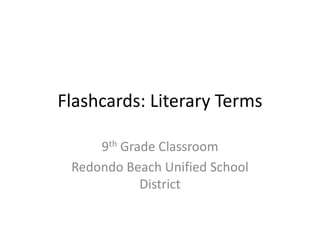
Literary Terms Flashcards 9th Grade
- 1. Flashcards: Literary Terms 9th Grade Classroom Redondo Beach Unified School District
- 2. Activities 1) Teaching activity 2) Creating flashcards activity 3) Flashcard process 1 4) Flashcard process 2 5) Flashcard process 3 6) Implementation activity 7) Periodical review
- 3. Her wart was as hairy as a gorilla’s back. Simile
- 4. Activities 1) Teaching activity (I will present the class with a definition of and an example of each of the terms. They will take notes and ask questions as we review the definitions and examples. After each definition and example is reviewed, the class will generate several unique examples of each term. Finally, each student will be responsible for creating their own unique example of the term. This will be done during a three day period (the terms divided as they are by the columns above, one column per day). 2) Creating flashcards activity (When all of the terms have been reviewed, class examples generated, and individual student examples generated, students will go through their notes and pick one example for each term, an example that they think really helps them understand the term. On day four, students will make their flashcards. On one side of the flashcard they will write the literary term. On the other side, they will write the example of the term and draw a picture that illustrates that example.)
- 5. Day 5: Both partners can use notes to provide feedback Day 6: Only quizzee can pull out notes to provide feedback Day 7: No elaboration, only knowledge-of-correct response Correct flashcards All flashcards Picture side Incorrect flashcards Incorrect flashcards Incorrect flashcards
- 6. Activities Cont. 3) Flashcard process 1 (On day five, students will partner up to review the terms. One at a time, they will test their partners (with the partners’ own flashcards) by showing the example with picture side and asking the student for the name of the term. The flashcards will be divided into two piles: correct and incorrect responses. After each student has gone through their flashcards, students will do a second round of only the incorrect terms. Subsequent rounds will be done of only incorrect terms until all have been answered correctly at least once. Give students directions regarding feedback (Day 5: partner response). The process from day five will be repeated on days six and seven (starting with all of the cards again). Day 6 feedback is note-supported by only quizzee and Day 7 is without elaboration. 4) Flashcard process 2 (On day eight, students will turn the flashcards around and see the term, but have to generate a correct example of the term (it doesn’t have to be the example on the card, but students must agree that it is a correct example, going to the teacher if they cannot agree or have questions). They will repeat the day five process with the other side of the flashcards. On day nine, students will repeat the process from day eight.)
- 7. Activities Cont. 5) Flashcard process 3 (On day ten, students will switch partners every round, and be tested with their partners’ flashcards instead of their own.) 6) Implementation activity (As reading class material, stop occasionally to have students identify literary techniques. As students become more confident at identification, then discuss effects of literary techniques usage.) 7) Periodical review (After day ten, flashcards will be periodically pulled out and used for review when there are a few minutes at the end of class or between activities.)